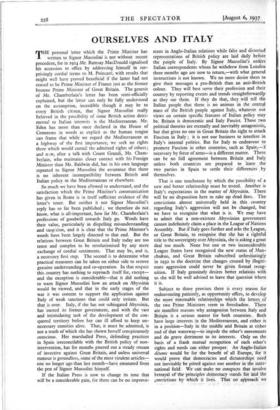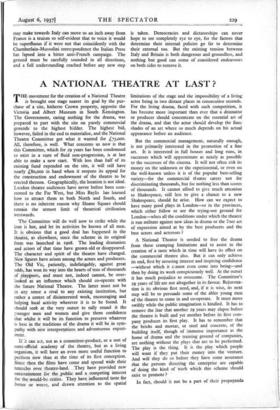OURSELVES AND ITALY
THE personal letter which the Prime Minister has written to Signor Mussolini is not: without recent precedent, for in 1924 Mr. Ramsay MacDonald signalised his accession to office by addresiing himself in sur- prisingly cordial terms to M. Poincare, with results that might well have proved beneficial if the latter had not ceased to be Prime Minister of France just as the former became Prime Minister of Great Britain. The genesis of Mr. Chamberlain's letter has been semi-officially explained, but the letter can only be fully understood on the assumptiOn, incredible though. it may be to every British citizen, that Signor Miisiolini really believed in the posiibilitY of some British action detri- mental to Italian interests 'n the Mediterranean: Mr. Eden has more than once declared in the House .of Commons in words as explicit as the human tongue can frame that while we regard the Mediterranean as a highway of the first importance, we seek no rights there which would curtail the admitted rights of others; and now, after a talk with Count Grandi, Mr. Cham- berlain, who maintains closer contact with his Foreign Minister than Mr. Baldwin did, has in his own language repeated to Signor Mussolini the assurance that there is no inherent incompatibility between British and Italian policy in the Mediterranean or elsewhere. - So much we have been allowed to understand, and the Satisfaction which the Prime Miniiter's communication has given in Rome is in itself sufficient evidence of the letter's tenor. But neither it nor Signor Mussolini's reply has so far been published ; we therefore do not . know, what is all-important, how far Mr. Chamberlain's professions of goodwill towards Italy go. Words have their value, particularly in dispelling misunderstanding and susp:cion, and it is clear that the Prime Minister's words have been largely directed to that end. But the relations between Great Britain and Italy today are too tense and complex to be revolutionised by any mere exchange of cordial sentiments. That may be, and is., a necessary first step. The second is to determine what practical measures can be taken on either side_ to restore genuine understanding and co-operation. In that respect this country has nothing to reproach itself for, except— and the exception is considerable—that it did nothing to warn Signor Mussolini how an attack on Abyssinia would be viewed, and that in the early stages of the war it was content to support the application against Italy of weak sanctions that could only irritate. But that ....is over. Italy, if she has not subjugated Abyssinia, has ousted its former government, and with the vast and intimidating task of the development of the con- quered territory before her can ill afford to keep un- necessary enmities alive. That, it must be admitted, is not a truth of which she has shown herself conspicuously conscious. Her marshalled Press,. defending practices in Spain irreconcilable with the British policy, of non- intervention, has for months Poured out a steady stream of invective against Great Britain, and unless universal rumour is groundless, some of the most virulent articles— one no longer -ago than last month—have. emanated from the pen of Signor Mussolini himself.
If the Italian Press is now to change its ,tone that will be a considerable gain, for there can be no improve- ment in Anglo-Italian relations while false and distOrted representations- of British- policy are laid daily before the people of Italy. By Signor -Mtissolini'S orderS- Italian-correspondents whom he WithdreW from London three months ago are now to return,—with what general instructions is not known. We no more desire them to give their messages a pro-British than an anti-British colour. They will best serve their profession and their country by reporting events. and trends straightfo_ rw. as they see them. If they do that,,they will tell the Italian: people that there is no animus in the „centrAl mass of the British people against Italy, whatever, our views on certain specific features of Italian policy may be. Britain is democratic and Italy Fascist. Those two political theories are eternally and inevitably antagonistic, but that gives no one in Great Britain. the right to attack Fascism in Italy ; rit is not our business to interfere in Italy's internal politics. But for Italy to endeavour to Spa promote Fascism in other countries, such as in,—)f .
. .
necessary by forte of arms-r-isa different matter. There can be no full agreement between. Britain and Italy unless both countries are prepared to _leave the two parties in Spain to settle their differences , by themselves.
That is one touchstone by which the possibility of a new and better relationship must be.tested, Another is Italy's expectations in the matter of Abyssinia., There will be no disposition here to rake up dead .fires, . The convictions almost universally held- in ..this.. country regarding Italy's. aggression will not ,be changed, , but we have to recognise that what is is. We may have to admit that a non-existent Abyssinian government Cannot indefinitely claim a place in theLeague of Nations Assembly. But if Italy go-es finther and asks the League, Or Great Britain, to recognise that she has irightftil: title to the sovereignty over Abyssinia, she is asking a great deal too much. None but one or two inconsiderable Leigne States have recognised the new status 'of Man-. chukuo, and Great Britain subscribed unhesitatingly in 1932 to the doctrine that changes created by illegiti- mate aggression could never be given fottnali.recog: nition. If Italy genuinely desires better relationi us she will be well -advised to leaVe that questiOn ivhere it Subject to those provisos there is every reason for endeavouring patiently, as opportunity offers, to develop the more reasonable relationships which- the letters of the two Prime Ministers seem to foreshadow. There aiemanifeit reasons why antagonism between Italy and Britain is a serious matter for both countries.. Both have large interests in the Mediterranean, and either_ is in a position—Italy in the .middle and Britain at either end of that waterway-toinopede the other'S movements and do grave detriment to its interests. Only on the basis of a frank mutual recognition of each other's rights and needs can either prosper. An-Anglo-Italian détente would be for -the- benefit of 'all Europe,' for would prove that' demoCiacies 'and dietatoishipS need not. inevitably b-e- pitted against one another in the inter national field: We - can' make-no compacts that involve betrayal of the principles' deirtocracy stands -fin 'and. The convictions-- by • liThich-it That no arrproach we may make towards Italy can move us an inch away from France is a truism so self-evident that to voice it would be superfluous if it were not that coincidently with the Chamberlain-Mussolini correspondence the Italian Press has lapsed into a bitter anti-French campaign. The ground must be carefully sounded in all directions, and a full understanding reached before any new step is taken. Democracies and dictatorships can never hope to see completely eye to eye, for the factors that determine their internal policies go far to determine their external too. But the existing tension between Italy and Britain is both dangerous and groundless, and nothing but good can come of considered endeavours on both sides to remove it.







































 Previous page
Previous page